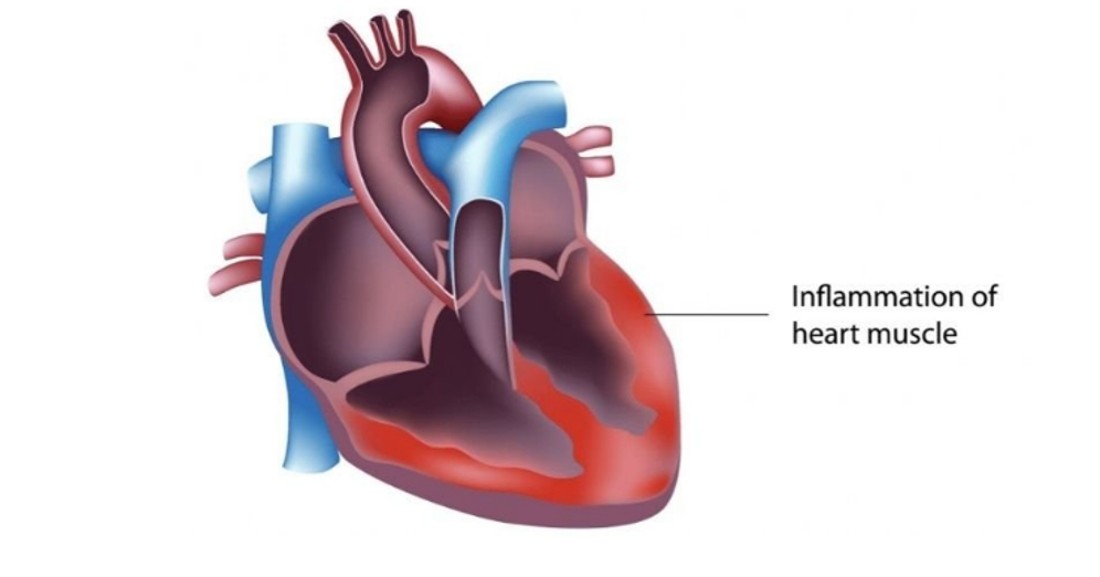Myocarditis is an increasingly recognised side effect of mRNA vaccines against Covid 19. The public messaging is that it is mild and rare. Are they?
Myocarditis (myo=muscle, card=heart, itis=inflammation) is a condition in which the heart muscle cells become inflamed and don’t function properly. Some cells may become sufficiently inflamed that they die and are replaced by scar tissue. If too many heart muscle cells become damaged or swollen, the heart may not be able to pump efficiently. The inflammation in the heart could also affect electrical pathways and may cause the heart to beat in abnormal (and potentially dangerous) rhythms. Some people who suffer with Myocarditis may end up needing a heart transplant.
Myocarditis can be caused by a number of things including toxins, viral infections, vaccines, medications, autoimmune conditions. The most common cause is viral infections and young men are particularly susceptible although this condition can occur in any age or biological gender.
Symptoms can include chest pain, shortness of breath, fever, palpitations (fast or irregular beating of the heart), fatigue and reduced ability to exercise. It is important to know that these symptoms need urgent medical attention if they occur following vaccination.
When you visit a doctor with symptoms suggestive of myocarditis, the doctor should want to know what the symptoms are, when and how they started, how they have evolved, what can improve or worsen them, whether you have taken any medications to help with them etc. A physical examination would usually be done checking temperature, blood pressure, pulse, listening to heart sounds and breath sounds in the chest.
Investigations could include:
• ECG (heart tracing),
• blood tests (including for inflammatory markers such as CRP, troponin which is a protein released from damaged heart muscle cells, possibly BNP if heart failure was suspected),
• chest xray,
• ECHO (ultrasound of the heart),
• MRI scan of heart
• a biopsy or sample of heart muscles tissue may be analysed in very rare cases.
Myocarditis can vary from a very mild illness with few symptoms, normal tests and complete recovery to severe illness that permanently damages the heart or causes sudden death.
Treatment of myocarditis varies depending on the level of damage and symptoms. Sometimes supportive care is sufficient, i.e. painkillers and rest while the body heals itself. Sometimes other medications are needed to help the heart pump more effectively, get rid of retained fluid, or control abnormal rhythms.
Doctors who practice Integrative Medicine, such as those at the NZDSOS Online Clinic may suggest a whole-foods diet that excludes sugar and seed oils, herbal anti-inflammatories, anti-oxidants and supplements that specifically support heart cells, such as Co-enzyme Q10 and carnitine. Your nutrient levels especially those of Vitamin D, Zinc and Selenium are also important.
Little data exists regarding myocarditis and pericarditis following the C-19 jabs in children aged 5-11, as these roll-outs are just starting. While not confirmed, reports indicate that at a school in in the US, 1 in 70 teenage boys developed myocarditis. This is much larger than expected for a disease described as “uncommon” affecting 1 in 100,000 children each year. However, it appears that in men between the ages of 13 and 40, the risk of myocarditis is higher following vaccination especially after the 2nd dose, than it is following Covid-19 infection. Furthermore, when researchers looked at the adverse events in VAERS, they found myocarditis rates in 12-15 year olds following the vaccine were 19 times higher than usual.
In New Zealand, as at 31 Dec 2021, there have been 455 reports to CARM of myocarditis or pericarditis (inflammation in the fibrous sac around the heart), following Covid 19 vaccination. It is accepted that only about 5% of adverse events are reported so it is likely there are many times more cases of myocarditis in NZ following the Pfizer vaccine.
As these vaccines are so new, no-one knows what the long-term outcome will be for those who suffer myocarditis following vaccination. It may be mild and those affected may make a full recovery but until more time has passed it is not possible to give any certainty to those who have been affected as to whether their heart will return to full function.
When making decisions about vaccines or boosters this is one possible adverse effect that needs to be considered in the decision-making process.
SOURCE:

Comments powered by CComment